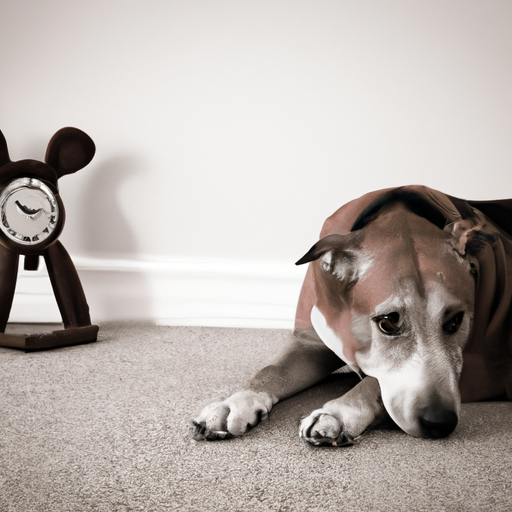Understanding the Canine Psyche
You’re not alone if you’re bewildered by your dog’s behavior when you leave home. While it may seem like they are being intentionally destructive or misbehaving, it’s crucial to realize that these actions stem from a place of anxiety and fear.
This condition, known as separation anxiety, is a common issue among dogs. It typically results from a deep attachment to their human companions, triggering panic when left alone.
Factors That Lead to Separation Anxiety
Several factors can cause separation anxiety in dogs. Here’s a list that you, as a caregiver, should be aware of:
- Change in Routine: Dogs are creatures of habit. A sudden change in your daily routine can upset them and trigger anxiety.
- Loss of a Family Member: The death or absence of a family member can cause emotional distress in dogs, leading to separation anxiety.
- Moving to a New Place: Moving to a different home can be a stressful experience for dogs, causing separation anxiety.
Symptoms of Separation Anxiety
Dogs can’t tell us when they’re feeling distressed, so it’s up to us to notice the signs. Here are some common symptoms that your dog might be suffering from separation anxiety:
- Frequent urination or defecation in inappropriate places
- Excessive chewing, digging, or other destructive behavior
- Constant barking or howling when left alone
- Attempts to escape when left alone, which might result in self-injury
Managing Separation Anxiety in Dogs
There’s no one-size-fits-all solution to managing separation anxiety, but here are some strategies that might help:
- Establish a Routine: Dogs thrive on routine. Establishing and maintaining a consistent daily schedule can help alleviate their anxiety.
- Training: Training them to be alone for short periods can help them get used to your absence.
- Comfort Items: Leaving a piece of your clothing or a favorite toy can comfort them in your absence.
| Strategies | Description |
|---|---|
| Establish a Routine | Maintain a consistent schedule |
| Training | Teach them to be alone for short periods |
| Comfort Items | Leave familiar items when you’re away |
The Role of Professional Help
In some cases, professional help may be necessary. If your dog’s separation anxiety is severe, it might be beneficial to consult a professional dog trainer or a veterinary behaviorist.
Frequently Asked Questions
Q: Can separation anxiety in dogs be cured?
A: While it’s challenging to completely cure separation anxiety, it can be managed effectively with time, patience, and consistent effort.
Q: Does breed play a role in separation anxiety?
A: Separation anxiety can affect any breed. However, some breeds are more prone to anxiety disorders due to genetic and environmental factors.
Q: Can medication help with separation anxiety?
A: In some cases, medication can help manage severe anxiety. However, it’s crucial to consult with a vet before starting any medication.
Remember, it’s not uncommon for dogs to experience separation anxiety. But with your love, patience, and consistent efforts, they can learn to cope with your absence in a healthier way.



